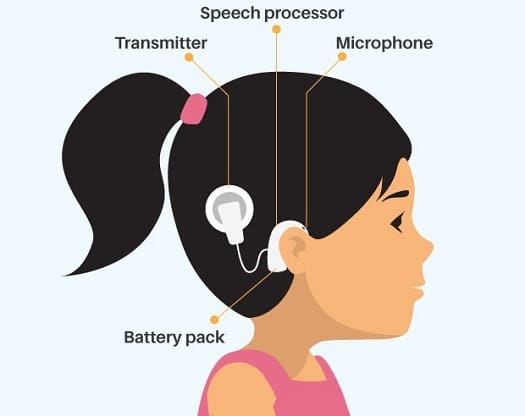People who suffer from hearing loss can benefit from cochlear implant surgery. The procedure is performed in order to insert a device inside the inner ear.
Generally speaking, hearing loss is caused by two factors. Due to intrinsic medical issues or a blockage in the ear canal, the ability to hear may be compromised. Conduction-related hearing loss is the term used to describe this type of hearing loss. It is suggested that surgical procedures be performed to correct the illness or blockage. Cochlear implants are not required in such situations.
Destruction of hair cells may also be a contributing factor to hearing loss. In this situation, the auditory nerve turns non-responsive. Sensorineural hearing loss is the term used to describe this type of hearing loss. Such situations necessitate the use of cochlear implants, which are surgically implanted into the ear.

In the case of sensorineural hearing loss, a cochlear implant operation is indicated. Also advised in situations where alternative hearing aids have failed to produce significant improvements in hearing efficacy. Candidates for this operation are those in whom the operation is not contraindicated, who have an unbroken auditory nerve, who have received complete information regarding the technique, risks, and outcomes of cochlear implant surgery, and who have a positive attitude toward the procedure.
The cochlear implant operation can be performed on both children and adults with the appropriate anesthesia. Having a cochlear implant surgery is an excellent option for children who have congenital hearing loss or who have hearing loss as a result of an injury.
Cochlear implant surgery is performed at a number of centers in India. Cochlear & hearing implants are less expensive in India when compared to western nations. There are several factors that influence the price of cochlear implant treatment in India, including the kind of implant used, the expertise of the surgeon, the type of facility used, and the amenities available. In India, the price of cochlear surgical treatment varies from INR 1, 16,000 to INR 2, 00,000 per implant.
The process for cochlear implant placement is begun following the good recommendations made by a team of experts that includes an ENT surgeon, an audiologist, and an anesthesiologist, among others. The procedure for a cochlear implant takes approximately 2-3 hours and therefore is performed under general anesthetic.
A tiny cut is made behind the ear to perform the procedure. A portion of the bony space up to an ear canal is visible. Afterward, the internal portion of the cochlear transplant is inserted between the muscles of the neck and skin and secured to the skull bone.
A cochlear cut is made in order to place the electrodes in the cochlea. Following the end of the treatment, the incised region is stitched shut and the dressing is applied.
Patients are usually discharged from the hospital one-two day after their operation has been completed. In the course of their recovery, the patients will receive instruction on how to operate the external component. In the case of deaf children who were born deaf, a psychologist provides assistance during the rehabilitation process.